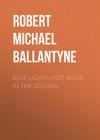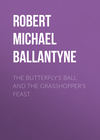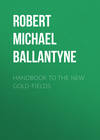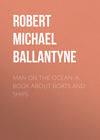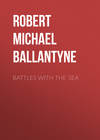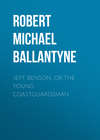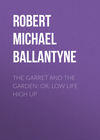Читать книгу: «Blue Lights: Hot Work in the Soudan»
Chapter One.
Hot Work in the Soudan. The False Step
There is a dividing ridge in the great northern wilderness of America, whereon lies a lakelet of not more than twenty yards in diameter. It is of crystal clearness and profound depth, and on the still evenings of the Indian summer its surface forms a perfect mirror, which might serve as a toilet-glass for a Redskin princess.
We have stood by the side of that lakelet and failed to note the slightest symptom of motion in it, yet somewhere in its centre there was going on a constant and mysterious division of watery particles, and those of them which glided imperceptibly to the right flowed southward to the Atlantic, while those that trembled to the left found a resting-place by the frozen shores of Hudson’s Bay.
As it is with the flow and final exit of those waters, so is it, sometimes, if not always, with the spirit and destiny of man.
Miles Milton, our hero, at the age of nineteen, stood at the dividing ridge of his life. If the oscillating spirit, trembling between right and wrong, had decided to lean to the right, what might have been his fate no one can tell. He paused on the balance a short time, then he leaned over to the left, and what his fate was it is the purpose of this volume to disclose. At the outset, we may remark that it was not unmixed good. Neither was it unmitigated evil.
Miles had a strong body, a strong will, and a somewhat passionate temper: a compound which is closely allied to dynamite!
His father, unfortunately, was composed of much the same materials. The consequences were sometimes explosive. It might have profited the son much had he studied the Scripture lesson, “Children, obey your parents in the Lord.” Not less might it have benefited the father to have pondered the words, “Fathers, provoke not your children to wrath.”
Young Milton had set his heart on going into the army. Old Milton had resolved to thwart the desire of his son. The mother Milton, a meek and loving soul, experienced some hard times between the two. Both loved her intensely, and each loved himself, not better perhaps, but too much!
It is a sad task to have to recount the disputes between a father and a son. We shrink from it and turn away. Suffice it to say that one day Miles and his father had a Vesuvian meeting on the subject of the army. The son became petulant and unreasonable; the father fierce and tyrannical. The end was that they parted in anger.
“Go, sir,” cried the father sternly; “when you are in a better frame of mind you may return.”
“Yes, father, I will go,” cried the son, starting up, “and I will never return.”
Poor youth! He was both right and wrong in this prophetic speech. He did return home, but he did not return to his father.
With fevered pulse and throbbing heart he rushed into a plantation that lay at the back of his father’s house. He had no definite intention save to relieve his feelings by violent action. Running at full speed, he came suddenly to a disused quarry that was full of water. It had long been a familiar haunt as a bathing-pool. Many a time in years past had he leaped off its precipitous margin into the deep water, and wantoned there in all the abandonment of exuberant youth. The leap was about thirty feet, the depth of water probably greater. Constant practice had rendered Miles so expert at diving and swimming that he had come to feel as much at home in the water as a New-Zealander.
Casting off his garments, he took the accustomed plunge by way of cooling his heart and brain. He came up from the depths refreshed, but not restored to equanimity. While dressing, the sense of injustice returned as strongly as before, and, with it, the hot indignation, so that on afterwards reaching the highway he paused only for a few moments. This was the critical point. Slowly but decidedly he leaned to the left. He turned his back on his father’s house, and caused the stones to spurt from under his heels as he walked rapidly away.
If Miles Milton had thought of his mother at that time he might have escaped many a day of bitter repentance, for she was as gentle as her husband was harsh; but the angry youth either forgot her at the moment, or, more probably, thrust the thought of her away.
Poor mother! if she had only known what a conflict between good and evil was going on in the breast of her boy, how she would have agonised in prayer for him! But she did not know. There was, however, One who did know, who loved him better even than his mother, and who watched and guarded him throughout all his chequered career.
It is not improbable that in spite of his resolves Miles would have relented before night and returned home had not a very singular incident intervened and closed the door behind him.
That day a notorious swindler had been tracked by a red-haired detective to the manufacturing city to which Miles first directed his steps. The bills describing the swindler set forth that he was quite young, tall, handsome, broad-shouldered, with black curling hair, and a budding moustache; that he was dressed in grey tweeds, and had a prepossessing manner. Now this chanced to be in some respects an exact description of Miles Milton!
The budding moustache, to be sure, was barely discernible, still it was sufficiently so for a detective to found on. His dress, too, was brown tweed, not grey; but of course dresses can be changed; and as to his manner, there could not be two opinions about that.
Now it chanced to be past one o’clock when Miles entered the town and felt himself impelled by familiar sensations to pause in front of an eating-house. It was a poor eating-house in a low district, but Miles was not particular; still further, it was a temperance coffee-house, but Miles cared nothing for strong drink. Strong health and spirits had served his purpose admirably up to that date.
Inside the eating-house there sat several men of the artisan class, and a few of the nondescript variety. Among the latter was the red-haired detective. He was engaged with a solid beef-steak.
“Oho!” escaped softly from his lips, when his sharp eyes caught sight of our hero. So softly did he utter the exclamation that it might have been a mere remark of appreciation addressed to the steak, from which he did not again raise his eyes for a considerable time.
The place was very full of people—so full that there seemed scarcely room for another guest; but by some almost imperceptible motion the red-haired man made a little space close to himself. The man next to him, with a hook-nose, widened the space by similar action, and Miles, perceiving that there was room, sat down.
“Bread and cheese,” he said to the waiter.
“Bread an’ cheese, sir? Yessir.”
Miles was soon actively engaged in mechanically feeding, while his mind was busy as to future plans.
Presently he became aware that the men on either side of him were scanning his features and person with peculiar attention.
“Coldish weather,” remarked the red-haired man, looking at him in a friendly way.
“It is,” replied Miles, civilly enough.
“Rather cold for bathin’, ain’t it, sir?” continued the detective carelessly, picking his teeth with a quill.
“How did you know that I’ve been bathing?” demanded Miles in surprise.
“I didn’t know it.”
“How did you guess it then?”
“Vell, it ain’t difficult to guess that a young feller ’as bin ’avin’ a swim w’en you see the ’air of ’is ’ead hall vet, an’ ’is pocket-’ankercher lookin’ as if it ’ad done dooty for a towel, not to mention ’is veskit ’avin’ bin putt on in a ’urry, so as the buttons ain’t got into the right ’oles, you see!”
Miles laughed, and resumed his bread and cheese.
“You are observant, I perceive,” he said.
“Not wery partiklarly so,” returned Redhair; “but I do obsarve that your boots tell of country roads. Was it a long way hout of town as you was bathin’ this forenoon, now?”
There was a free and easy familiarity about the man’s tone which Miles resented, but, not wishing to run the risk of a disagreement in such company, he answered quietly— “Yes, a considerable distance; it was in an old quarry where I often bathe, close to my father’s house.”
“Ha! jest so, about ’alf-way to the willage of Ramplin’, w’ere you slep’ last night, if report speaks true, an’ w’ere you left the grey tweeds, unless, p’r’aps, you sunk ’em in the old quarry.”
“Why, what on earth do you mean?” asked Miles, with a look of such genuine surprise that Redhair was puzzled, and the man with the hooked nose, who had been listening attentively, looked slightly confused.
“Read that, sir,” said the detective, extracting a newspaper cutting from his pocket and laying it on the table before Miles.
While he read, the two men watched him with interest, so did some of those who sat near, for they began to perceive that something was “in the wind.”
The tell-tale blood sprang to the youth’s brow as he read and perceived the meaning of the man’s remarks. At this Redhair and Hook-nose nodded to each other significantly.
“You don’t mean to say,” exclaimed Miles, in a tone of grand indignation which confirmed the men in their suspicion, “that you think this description applies to me?”
“I wouldn’t insinivate too much, sir, though I have got my suspicions,” said Redhair blandly; “but of course that’s easy settled, for if your father’s ’ouse is anyw’ere hereabouts, your father won’t object to identify his son.”
“Ridiculous!” exclaimed Miles, rising angrily at this interruption to his plans. The two men rose promptly at the same moment. “Of course my father will prove that you have made a mistake, but—”
He hesitated in some confusion, for the idea of re-appearing before his father so soon, and in such company, after so stoutly asserting that he would never more return, was humiliating. The detective observed the hesitation and became jocose.
“If you’d rather not trouble your parent,” said Redhair, “you’ve got no call to do it. The station ain’t far off, and the sooner we get there the better for all parties.”
A slight clink of metal at this point made Miles aware of the fact that Hook-nose was drawing a pair of handcuffs from one of his pockets.
The full significance of his position suddenly burst upon him. The thought of being led home a prisoner, or conveyed to the police-station handcuffed, maddened him; and the idea of being thus unjustly checked at the very outset of his independent career made him furious. For a few moments he stood so perfectly still and quiet that the detectives were thrown slightly off their guard. Then there was an explosion of some sort within the breast of Miles Milton. It expended itself in a sudden impulse, which sent Redhead flat on the table among the crockery, and drove Hook-nose into the fireplace among the fire-irons. A fat little man chanced to be standing in the door-way. The same impulse, modified, shot that little man into the street like a cork out of a bottle, and next moment Miles was flying along the pavement at racing speed, horrified at what he had done, but utterly reckless as to what might follow!
Hearing the shouts of pursuers behind him, and being incommoded by passers-by in the crowded thoroughfare, Miles turned sharply into a by-street, and would have easily made his escape—being uncommonly swift of foot—had he not been observed by an active little man of supple frame and presumptuous tendencies. Unlike the mass of mankind around him—who stared and wondered—the active little man took in the situation at a glance, joined in the pursuit, kept well up, thus forming a sort of connecting-link between the fugitive and pursuers, and even took upon himself to shout “Stop thief!” as he ran. Miles endeavoured to throw him off by putting on, as schoolboys have it, “a spurt.” But the active little man also spurted and did not fall far behind. Then Miles tried a second double, and got into a narrow street, which a single glance showed him was a blind alley! Disappointment and anger hereupon took possession of him, and he turned at bay with the tiger-like resolve to run a-muck!
Fortunately for himself he observed a pot of whitewash standing near a half-whitened wall, with a dirty canvas frock and a soiled billycock lying beside it. The owner of the property had left it inopportunely, for, quick as thought, Miles wriggled into the frock, flung on the billycock, seized the pot, and walked in a leisurely way to the head of the alley. He reached it just as the active little man turned into it, at the rate of ten miles an hour. A yell of “Stop thief!” issued from the man’s presumptuous lips at the moment.
His injunction was obeyed to the letter, for the would-be thief of an honest man’s character on insufficient evidence was stopped by Miles’s bulky person so violently that the whitewash was scattered all about, and part of it went into the active man’s eyes.
To squash the large brush into the little man’s face, and thus effectually complete what his own recklessness had begun, was the work of an instant. As he did it, Miles assumed the rôle of the injured party, suiting his language to his condition.
“What d’ee mean by that, you houtrageous willain?” he cried savagely, to the great amusement of the bystanders, who instantly formed a crowd round them. “Look wot a mess you’ve bin an’ made o’ my clean frock! Don’t you see?”
The poor little man could not see. He could only cough and gasp and wipe his face with his coat-tails.
“I’d give you in charge o’ the pleece, I would, if it wasn’t that you’ve pretty well punished yourself a’ready,” continued Miles. “Take ’im to a pump some o’ you, ’cause I ain’t got time. Good-day, spider-legs, an’ don’t go for to run into a hartist again, with a paint-pot in ’is ’and.”
So saying, Miles pushed through the laughing crowd and sauntered away. He turned into the first street he came to, and then went forward as fast as was consistent with the idea of an artisan in a hurry. Being utterly ignorant of the particular locality into which he had penetrated—though well enough acquainted with the main thoroughfares of the city—his only care was to put as many intricate streets and lanes as possible between himself and the detectives. This was soon done, and thereafter, turning into a darkish passage, he got rid of the paint-pot and borrowed costume.
Fortunately he had thrust his own soft helmet-shaped cap into his breast at the time he put on the billycock, and was thus enabled to issue from the dark passage very much like his former self, with the exception of a few spots of whitewash, which were soon removed.
Feeling now pretty safe, our hero walked a considerable distance through the unknown parts of the city before he ventured to inquire the way to thoroughfares with which he was familiar. Once in these, he proceeded at a smart pace to one of the railway stations, intending to leave town, though as yet he had formed no definite plan of action. In truth, his mind was much troubled and confused by the action of his conscience, for when the thought of leaving home and entering the army as a private soldier, against his father’s wishes, crossed his mind, Conscience faithfully shook his head; and when softer feelings prevailed, and the question arose irresistibly, “Shall I return home?” the same faithful friend whispered, “Yes.”
In a state of indecision, Miles found himself borne along by a human stream to the booking-office. Immediately in front of him were two soldiers,—one a sergeant, and the other a private of the line.
Both were tall handsome men, straight as arrows, and with that air of self-sufficient power which is as far removed from arrogance as it is from cowardice, and is by no means an uncommon feature in men of the British army.
Miles felt a strong, unaccountable attraction towards the young private. He had not yet heard his voice nor encountered his eye; indeed, being behind him, he had only seen his side-face, and as the expression on it was that of stern gravity, the attractive power could not have lain in that. It might have lain in the youthful look of the lad, for albeit a goodly man in person, he was almost a boy in countenance, being apparently not yet twenty years of age.
Miles was at last roused to the necessity for prompt and decisive action by the voice of the sergeant saying in tones of authority—
“Portsmouth—third—two—single.”
“That’s the way to go it, lobster!” remarked a shabby man, next in the line behind Miles.
The grave sergeant paid no more regard to this remark than if it had been the squeak of a mouse.
“Now, then, sir, your carridge stops the way. ’Eave a’ead. Shall I ’elp you?” said the shabby man.
Thus admonished, Miles, scarce knowing what he said, repeated the sergeant’s words—
“Portsmouth—third—two—single.”
“Vy, you ain’t agoin’ to pay for me, are you?” exclaimed the shabby man in smiling surprise.
“Oh! beg pardon. I mean one,” said Miles to the clerk, quickly.
The clerk retracted the second ticket with stolid indifference, and Miles, hastening to the platform, sat down on a seat, deeply and uncomfortably impressed with the fact that he possessed little or no money! This unsatisfactory state of things had suddenly burst upon him while in the act of paying for his ticket. He now made a careful examination of his purse, and found its contents to be exactly seven shillings and sixpence, besides a few coppers in his trousers-pocket.
Again indecision assailed him. Should he return? It was not too late. “Yes,” said Conscience, with emphasis. “No,” said Shame. False pride echoed the word, and Self-will re-echoed it. Still our hero hesitated, and there is no saying what the upshot might have been if the bell had not rung at the moment, and, “Now, then, take your seats!” put an end to the controversy.
Another minute, and Miles Milton was seated opposite the two soldiers, rushing towards our great southern seaport at the rate of forty miles an hour.
Chapter Two.
Shows some of the Consequences of the False Step, and introduces the Reader to Peculiar Company
Our hero soon discovered that the sergeant was an old campaigner, having been out in Egypt at the beginning of the war, and fought at the famous battle of Tel-el-Kebir.
In his grave and undemonstrative way and quiet voice, this man related some of his experiences, so as not only to gain the attention of his companion in arms, but to fascinate all who chanced to be within earshot of him—not the least interested among whom, of course, was our friend Miles.
As the sergeant continued to expatiate on those incidents of the war which had come under his own observation, three points impressed themselves on our hero: first, that the sergeant was evidently a man of serious, if not religious, spirit; second, that while he gave all due credit to his comrades for their bravery in action, he dwelt chiefly on those incidents which brought out the higher qualities of the men, such as uncomplaining endurance, forbearance, etcetera, and he never boasted of having given “a thorough licking” to the Egyptians, nor spoke disparagingly of the native troops; lastly, that he seemed to lay himself out with a special view to the unflagging entertainment of his young comrade.
The reason for this last purpose he learned during a short halt at one of the stations. Seeing the sergeant standing alone there, Miles, after accosting him with the inevitable references to the state of the weather, remarked that his comrade seemed to be almost too young for the rough work of soldiering.
“Yes, he is young enough, but older than he looks,” answered the sergeant. “Poor lad! I’m sorry for him.”
“Indeed! He does not seem to me a fit subject for pity. Young, strong, handsome, intelligent, he seems pretty well furnished to begin the battle of life—especially in the army.”
“‘Things are not what they seem,’” returned the soldier, regarding his young questioner with something between a compassionate and an amused look. “‘All is not gold that glitters.’ Soldiering is not made up of brass bands, swords, and red coats!”
“Having read a good deal of history I am well aware of that,” retorted Miles, who was somewhat offended by the implication contained in the sergeant’s remarks.
“Well, then, you see,” continued the sergeant, “all the advantages that you have mentioned, and which my comrade certainly possesses, weigh nothing with him at all just now, because this sudden call to the wars separates him from his poor young wife.”
“Wife!” exclaimed Miles; “why, he seems to me little more than a boy—except in size, and perhaps in gravity.”
“He is over twenty, and, as to gravity—well, most young fellows would be grave enough if they had to leave a pretty young wife after six months of wedded life. You see, he married without leave, and so, even if it were a time of peace, his wife would not be recognised by the service. In wartime he must of course leave her behind him. It has been a hard job to prevent him from deserting, and now it’s all I can do to divert his attention from his sorrow by stirring him up with tales of the recent wars.”
At this point the inexorable bell rang, doors were banged, whistles sounded, and the journey was resumed.
Arrived at Portsmouth, Miles was quickly involved in the bustle of the platform. He had made up his mind to have some private conversation with the sergeant as to the possibility of entering her Majesty’s service as a private soldier, and was on the point of accompanying his military travelling companions into the comparative quiet of the street when a porter touched his cap—
“Any luggage, sir?”
“Luggage?—a—no—no luggage!”
It was the first moment since leaving home that the thought of luggage had entered into his brain! That thought naturally aroused other thoughts, such as lodgings, food, friends, funds, and the like. On turning to the spot where his military companions had stood, he discovered that they were gone. Running to the nearest door-way he found it to be the wrong one, and before he found the right one and reached the street the two soldiers had vanished from the scene.
“You seem to be a stranger here, sir. Can I direct you?” said an insinuating voice at his elbow.
The speaker was an elderly man of shabby-genteel appearance and polite address. Miles did not quite like the look of him. In the circumstances, however, and with a strangely desolate feeling of loneliness creeping over him, he did not see his way to reject a civil offer.
“Thank you. I am indeed a stranger, and happen to have neither friend nor acquaintance in the town, so if you can put me in the way of finding a respectable lodging—a—a cheap one, you will greatly oblige me.”
“With pleasure,” said the man, “if you will accompany—”
“Stay, don’t trouble yourself to show me the way,” interrupted Miles; “just name a house and the street, that will—”
“No trouble at all, sir,” said the man. “I happen to be going in the direction of the docks, and know of excellent as well as cheap lodgings there.”
Making no further objection, Miles followed his new friend into the street. For some time, the crowd being considerable and noisy, they walked in silence.
At the time we write of, Portsmouth was ringing with martial music and preparations for war.
At all times the red-coats and the blue-jackets are prominent in the streets of that seaport; for almost the whole of our army passes through it at one period or another, either in going to or returning from “foreign parts.” But at this time there was the additional bustle resulting from the Egyptian war. Exceptional activity prevailed in its yards, and hurry in its streets. Recruits, recently enlisted, flocked into it from all quarters, while on its jetties were frequently landed the sad fruits of war in the form of wounded men.
“Have you ever been in Portsmouth before?” asked the shabby-genteel man, on reaching a part of the town which was more open and less crowded.
“Never. I had no idea it was so large and bustling,” said Miles.
“The crowding and bustling is largely increased just now, of course, in consequence of the war in Egypt,” returned the man. “Troops are constantly embarking, and others returning. It is a noble service! Men start in thousands from this port young, hearty, healthy, and full of spirit; they return—those of them who return at all—sickly, broken-down, and with no spirit at all except what they soon get poured into them by the publicans. Yes; commend me to the service of my Queen and country!”
There was a sneering tone in the man’s voice which fired his companion’s easily roused indignation.
“Mind what you say about our Queen while in my company,” said Miles sternly, stopping short and looking the man full in the face. “I am a loyal subject, and will listen to nothing said in disparagement of the Queen or of her Majesty’s forces.”
“Bless you, sir,” said the man quickly, “I’m a loyal subject myself, and wouldn’t for the world say a word against her Majesty. No more would I disparage her troops; but, after all, the army ain’t perfect, you know. Even you must admit that, sir. With all its noble qualities there’s room for improvement.”
There was such an air of sincerity—or at least of assumed humility—in the man’s tone and manner that Miles felt it unjustifiable to retain his indignation. At the same time, he could not all at once repress it, and was hesitating whether to fling off from the man or to forgive him, when the sound of many voices, and of feet tramping in regular time, struck his ear and diverted his attention. Next moment the head of a regiment, accompanied by a crowd of juvenile admirers, swept round the corner of the street. At the same instant a forest of bayonets gleamed upon the youth’s vision, and a brass band burst with crashing grandeur upon his ear, sending a quiver of enthusiasm into the deepest recesses of his soul, and stirring the very marrow in his bones!
Miles stood entranced until the regiment had passed, and the martial strains were softened by distance; then he looked up and perceived that his shabby companion was regarding him with a peculiar smile.
“I think you’ve a notion of being a soldier,” he said, with a smile.
“Where is that regiment going?” asked Miles, instead of answering the question.
“To barracks at present; to Egypt in a few days. There’ll be more followin’ it before long.”
It was a distracting as well as an exciting walk that Miles had through the town, for at every turn he passed couples or groups of soldiers, or sailors, or marines, and innumerable questions sprang into and jostled each other in his mind, while, at the same moment, his thoughts and feelings were busy with his present circumstances and future prospects. The distraction was increased by the remarks and comments of his guide, and he would fain have got rid of him; but good-feeling, as well as common-sense, forbade his casting him off without sufficient reason.
Presently he stopped, without very well knowing why, in front of a large imposing edifice. Looking up, he observed the words Soldiers’ Institute in large letters on the front of it.
“What sort of an Institute is that?” he asked.
“Oh! it’s a miserable affair, where soldiers are taken in cheap, as they say, an’ done for,” returned the shabby man hurriedly, as if the subject were distasteful to him. “Come along with me and I’ll show you places where soldiers—ay, and civilians too—can enjoy themselves like gentlemen, an’ get value for their money.”
As he spoke, two fine-looking men issued from a small street close to them, and crossed the road—one a soldier of the line, the other a marine.
“Here it is, Jack,” exclaimed the soldier to his friend; “Miss Sarah Robinson’s Institoot, that you’ve heard so much about. Come an’ I’ll show you where you can write your letter in peace—”
Thus much was overheard by Miles as they turned into a side-street, and entered what was obviously one of the poorer districts of the town.
“Evidently that soldier’s opinion does not agree with yours,” remarked Miles, as they walked along.
“More’s the pity!” returned the shabby man, whose name he had informed his companion was Sloper. “Now we are getting among places, you see, where there’s a good deal of drinking going on.”
“I scarcely require to be told that,” returned Miles, curtly; for he was beginning to feel his original dislike to Mister Sloper intensified.
It did not indeed require any better instructor than eyes and ears to inform our hero that the grog-shops around him were full, and that a large proportion of the shouting and swearing revellers inside were soldiers and seamen.
By this time it was growing dark, and most of the gin-palaces were beginning to send forth that glare of intense and warm light with which they so knowingly attract the human moths that constitute their prey.
“Here we are,” said Sloper, stopping in front of a public-house in a narrow street. “This is one o’ the respectable lodgin’s. Most o’ the others are disreputable. It’s not much of a neighbourhood, I admit.”
“It certainly is not very attractive,” said Miles, hesitating.
“You said you wanted a cheap one,” returned Sloper, “and you can’t expect to have it cheap and fashionable, you know. You’ve no occasion to be afraid. Come in.”
The arguments of Mr Sloper might have failed to move Miles, but the idea of his being afraid to go anywhere was too much for him.
“Go in, then,” he said, firmly, and followed.
The room into which he was ushered was a moderately large public-house, with a bar and a number of tables round the room, at which many men and a few women were seated; some gambling, others singing or disputing, and all drinking and smoking. It is only right to say that Miles was shocked. Hitherto he had lived a quiet and comparatively innocent country life. He knew of such places chiefly from books or hearsay, or had gathered merely the superficial knowledge that comes through the opening of a swing-door. For the first time in his life he stood inside a low drinking-shop, breathing its polluted atmosphere and listening to its foul language. His first impulse was to retreat, but false shame, the knowledge that he had no friend in Portsmouth, or place to go to, that the state of his purse forbade his indulging in more suitable accommodation, and a certain pride of character which made him always determine to carry out what he had resolved to do—all these considerations and facts combined to prevent his acting on the better impulse. He doggedly followed his guide to a small round table and sat down.
Покупайте книги и получайте бонусы в Литрес, Читай-городе и Буквоеде.
Участвовать в бонусной программе
